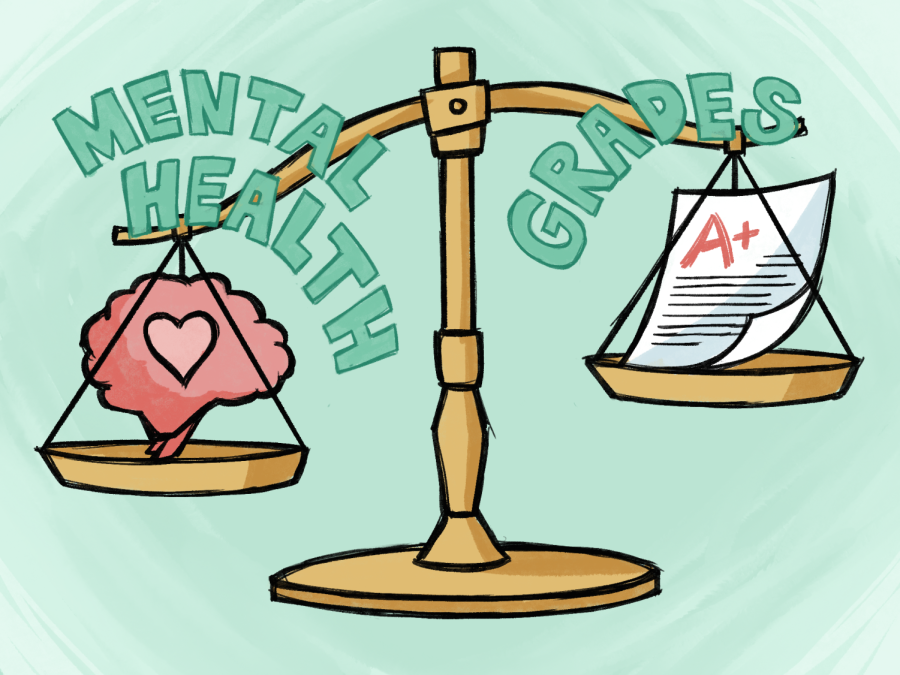Five ways to balance mental health and academics, according to one reporter
Despite academic expectations, it is important to balance mental health over school.
Many students are regularly under enormous pressure. Monitoring tests, homework, assignments, grades and extracurricular activities takes up large amounts of time and energy. It can be a huge struggle balancing school, mental and physical health.
According to professional counselor Kathleen Smith, the most commonly reported source for stress in teens is school. Letting go of stress can be very difficult, but prioritizing your mental health over school does not mean your academic performance will worsen. It can actually improve. There are a few easy shifts you can make to improve your mental and physical health, and your performance in school.
1. Get more sleep
Just getting a few more hours of sleep can make huge positive changes in your life. The Canadian Pediatric Society recommends teenagers receive between 8-10 hours of sleep per night. Failure to get enough sleep can affect both personal life and life at school, with repercussions like trouble concentrating or mood swings. If you are having trouble sleeping, try setting yourself a bedtime, getting more exercise or staying off screens for a while before going to bed. Obtaining an adequate amount of sleep can leave you more motivated and ready to face the day.
2. Take breaks
Sometimes it can be hard to stop and take a relaxing break, especially if you have lots of work that still needs to be done. According to the U.K. organization, the Well Being Thesis, breaks can actually leave you more productive and motivated. Breaks are also a way to partake in your hobbies and interests outside of school. Sometimes a heavy academic workload can get in the way of other parts of your life. Breaks are a great way to get in touch with the things you enjoy most. By stopping and doing something relaxing, you can recover from your daily work and stresses.
3. Practice relaxation techniques
In our busy lives, recognizing the importance of a peaceful moment can be difficult. Taking just a few minutes to relax can be a great way to decrease your stress levels. According to the Cleveland Clinic, there are many relaxation techniques to choose from, such as meditation, deep breathing and progressive muscle relaxation. Using these techniques can create a moment of calm and relieve some stress.
4. Do not be afraid to ask for help if you need it
At SCHS, there are many resources for students struggling with school and mental or physical health. If you are looking for help or someone to talk to, try contacting the Wellness Center, or a trusted faculty member.
5. Be patient with yourself
It is important to realize that you are not perfect. It is okay to feel stressed or overwhelmed, and most people go through those emotions. Taking time for yourself is important because it can leave you more prepared to face everyday challenges. Focusing too much on perfection can be dangerous because it is unrealistic to expect yourself or others to always be 100 percent perfect in everything.
School systems often promote the idea that grades are the most important aspect of your life. This expectation, however, often leaves students prioritizing their schoolwork over their own physical and mental health. Implementing these tips into your everyday life can be a great way to decrease your stress levels.



Clifford Cardinal • Feb 9, 2024 at 8:21 am
Again, as an effort to prepare our Child Leah‘S desire to excel at Forest Heights Elementary in Grade One, she has become rebellious at home and often crying and begging not to go to school for the day. Her Grade One Teacher does not invite the Parent to discuss our Child mental health needs at school which surfaced after an incident that involved around Racial Profiling a child that just turned 7 years old on December 31, 2023. Prior to this Leah was surviving in a school where she is the lone Indigenous Child due to our move to Edmonton long before her birth.
Previously at Kindergarten she was proud to be part of the Inclusion that is she Philosophy based on all of Alberta Schools. I, being the sole provider for our family’s lives, have been a Principal and had won Awards in Education do know that it’s not part of the responsibility to try to be included within the School’s’ philosophy and the Schools identifying unique Culture as an Institute where are nurtured into future leaders as is the premise in Alberta’s Growth in accepting the Global Community into Forest Heights.
Clifford Cardinal • Feb 9, 2024 at 7:56 am
Our Child is being overloaded with academics rather than being Part of inclusiveness Takes Away The desire to give in to do school work do impact a 6 year old as to how School Admin sees our Child, in addition our Child is lowering her personal growth and goals in her future life, as she did in Kindergarten Year. Her K-5 Teacher Miss Hoffman was very influential in Leah’s Mental Health and our Plains Cree Culture is often used or brought up by her Grade One Teacher, and parenting is evolving into, “Trying to Fit in” as a way to being accepted by the School Admin Culture and School Philosophy that leans to oppose the concept of Inclusion.